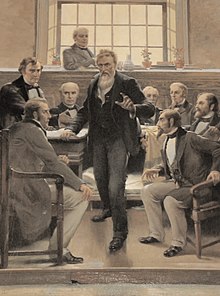
John Brown's last speech, so called by his first biographer, James Redpath, was delivered on November 2, 1859. John Brown was being sentenced in a courtroom packed with whites in Charles Town, Virginia, after his conviction for murder, treason against the Commonwealth of Virginia, and inciting a slave insurrection.[2]: 340 According to Ralph Waldo Emerson, the speech's only equal in American oratory is the Gettysburg Address.[3][4][5]
As was his custom, Brown spoke extemporaneously and without notes, although he had evidently thought about what he would say and he knew the opportunity was coming. Transcribed by a phonographer (reporter-stenographer), which newspapers used for important speeches, it was on the next day's front page of countless newspapers nationwide, including the New York Times.
The American Anti-Slavery Society then predicted that his execution would begin his martyrdom, or that potential clemency would remove "so much capital [...] out of the abolition sails".
- ^ Essex County, New York, Courthouse History, archived from the original on July 22, 2021, retrieved July 22, 2021
- ^ Redpath, James (1860). The Public Life of Captain John Brown. Boston: Thayer and Eldridge.
- ^ Emerson, Ralph Waldo (1909). "Remarks at the funeral services [for Abraham Lincoln] held in Concord, April 19, 1865". Centenary Edition. The Complete Works of Ralph Waldo Emerson. Vol. 11. Boston and New York: Houghton Mifflin. p. 334.
- ^ Nudelman, Franny (2004). John Brown's body: slavery, violence & the culture of war. Chapel Hill, North Carolina: University of North Carolina Press. p. 36. ISBN 0807828831.
- ^ Sanborn, F. B. (1909). Recollections of Seventy Years. Vol. 1. Boston: Richard G. Badger, The Gorham Press. p. 252.